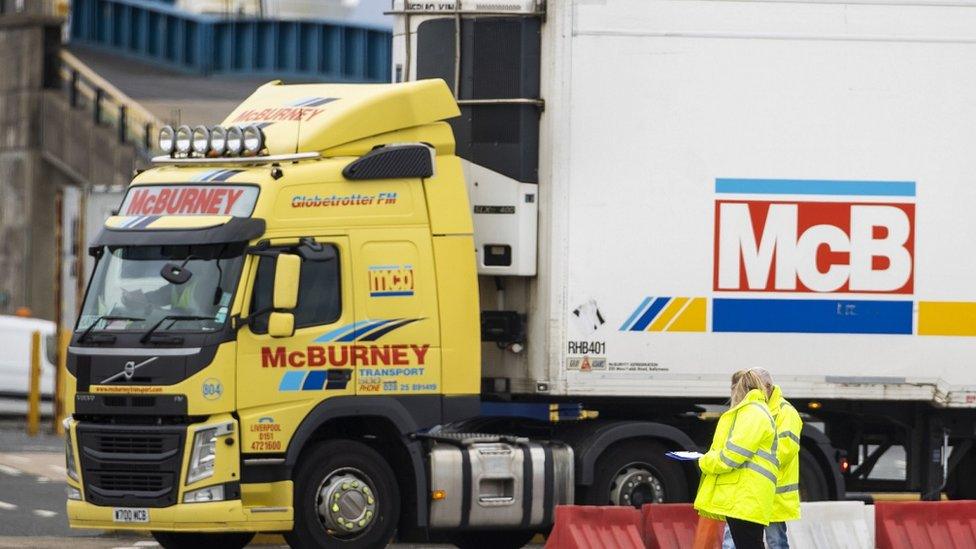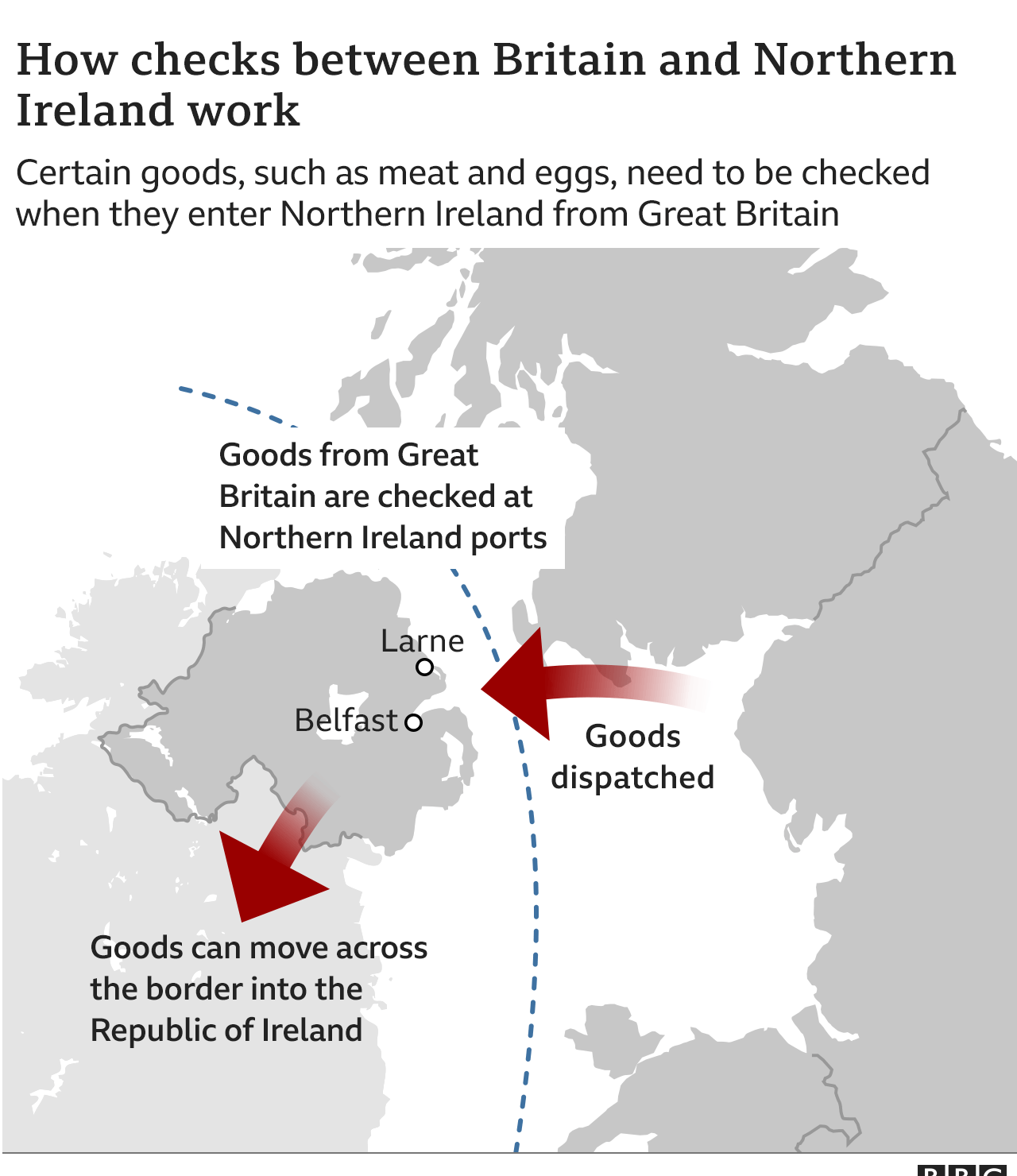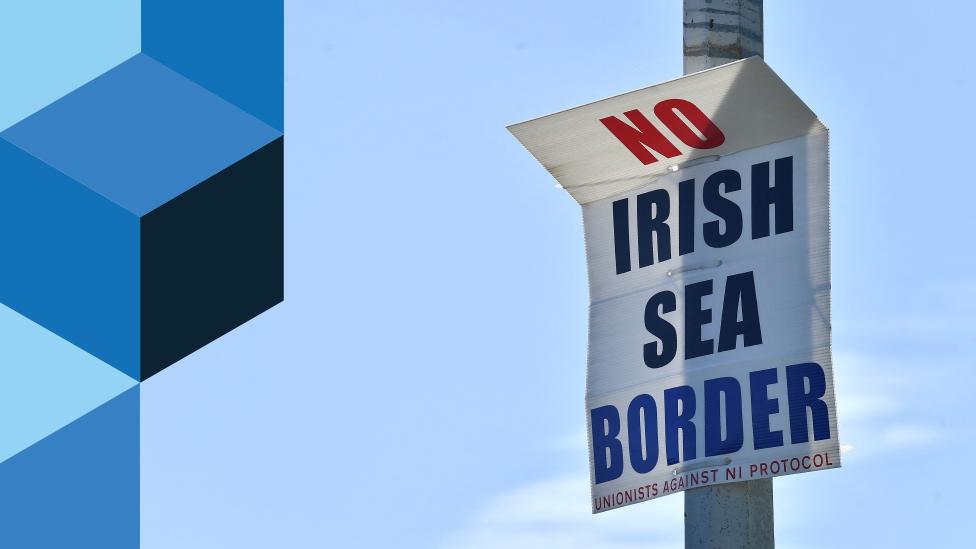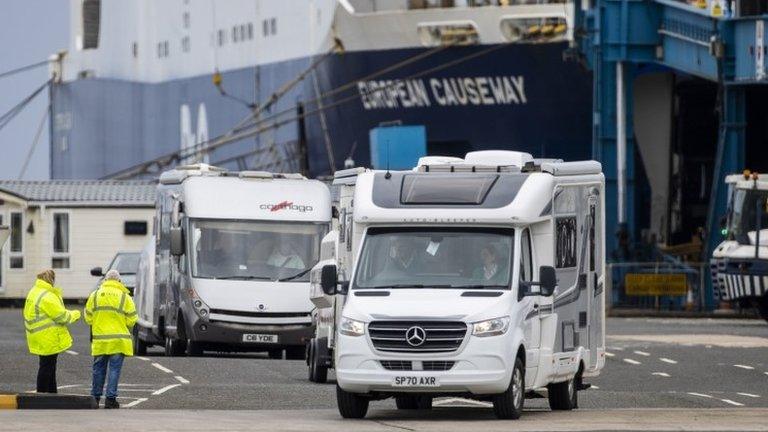Northern Ireland Protocol: MPs reject changes to controversial bill
- Published
- comments

New legislation would give ministers the power to scrap parts of the post-Brexit deal
MPs have voted to reject changes to the government's contentious Northern Ireland Protocol Bill.
It started its committee stage in the House of Commons on Wednesday, meaning amendments can be voted on.
Most parties in Northern Ireland oppose the bill but most candidates vying to become the next Conservative leader say they remain committed to passing it.
The bill would give ministers the power to scrap parts of the post-Brexit deal between the UK and the EU.
The protocol is part of the 2019 Brexit deal and keeps Northern Ireland in the EU's single market for goods, preventing a hard border with the Republic of Ireland.
But it means checks on some items which come into Northern Ireland from other parts of the UK, creating a trade border in the Irish Sea.
Unionist parties in Northern Ireland are all opposed to the protocol, and insist the legislation is necessary to protect NI's place in the UK.
Prime Minister Boris Johnson said in June that he believed legislation on the deal could be passed by the end of the year.
The legislation will face further scrutiny in the Commons before moving to the Lords in the autumn, where it is likely to face tougher opposition from peers.
The SDLP, Alliance and Labour attempted to water the bill down with various amendments but none of them were successful during Wednesday's debate.
The Democratic Unionist Party (DUP) insists that its priority remains ensuring any new prime minister does not backtrack from the bill.
Earlier the party's leader Sir Jeffrey Donaldson said he had a "personal commitment" to return to Stormont and serve as deputy first minister in a restored executive, but only once the protocol was resolved.
'Business as usual'
Speaking ahead of the debate, Northern Ireland Secretary Shailesh Vara said the government remained determined to pass legislation to override the protocol, if agreement could not be reached with the EU.
He said the bill was a last resort for a protocol which was not working and despite the Conservative leadership race he would ensure Northern Ireland issues would remain a priority.
"I will be sitting on the front bench for most of today as the committee stage of the protocol legislation goes through," Mr Vara told BBC News NI.
"I can assure you it's business as usual and nobody is forgetting anyone."


The government's plans, published earlier in June, were met with a fierce backlash from the EU, which launched legal action against the UK government over the legislation.
Mr Šefčovič has also indicated that further measures may follow if the bill proceeds, including a trade war between the UK and EU.

What is in the Northern Ireland Protocol bill?
The UK government published plans for the bill earlier this month. At the centre of the proposal is the concept of green lanes and red lanes for trade.
This would mean:
Goods coming from Great Britain into Northern Ireland and which are staying would use the green lane. This means there would be no checks and paperwork would be minimal
GB goods moving through NI into Ireland or the wider European Union would use the red lane and continue to be checked at NI ports
London also wants any trade disputes resolved by "independent arbitration" and not by the European Court of Justice, and for Northern Ireland to benefit from the same tax breaks as elsewhere in the UK.

A majority of members of the Northern Ireland Assembly, including Sinn Féin, Alliance and the SDLP, say the protocol is necessary to mitigate the effects of Brexit in Northern Ireland.
Sinn Féin won the most seats in May's assembly election but the DUP, which came second, is refusing to re-enter a power-sharing executive until its concerns about the protocol are addressed.
On Wednesday, DUP MP Gregory Campbell said he did not expect the protocol legislation to change significantly through committee amendments.
He told BBC News NI's Good Morning Ulster the issue of the protocol needed to be resolved by the next prime minister, but he declined to suggest who the party's preferred candidate would be.
Alliance MP Stephen Farry said the bill was being introduced "over the heads of the majority of people in Northern Ireland" and the committee hearings would be a chance to test the arguments of the government's proposal.
He said he expected some amendments would be linked to "the consent of the Northern Ireland Assembly for what's happening".
Related topics
- Published22 July 2022

- Published27 June 2022

- Published15 June 2022

- Published2 February 2024
